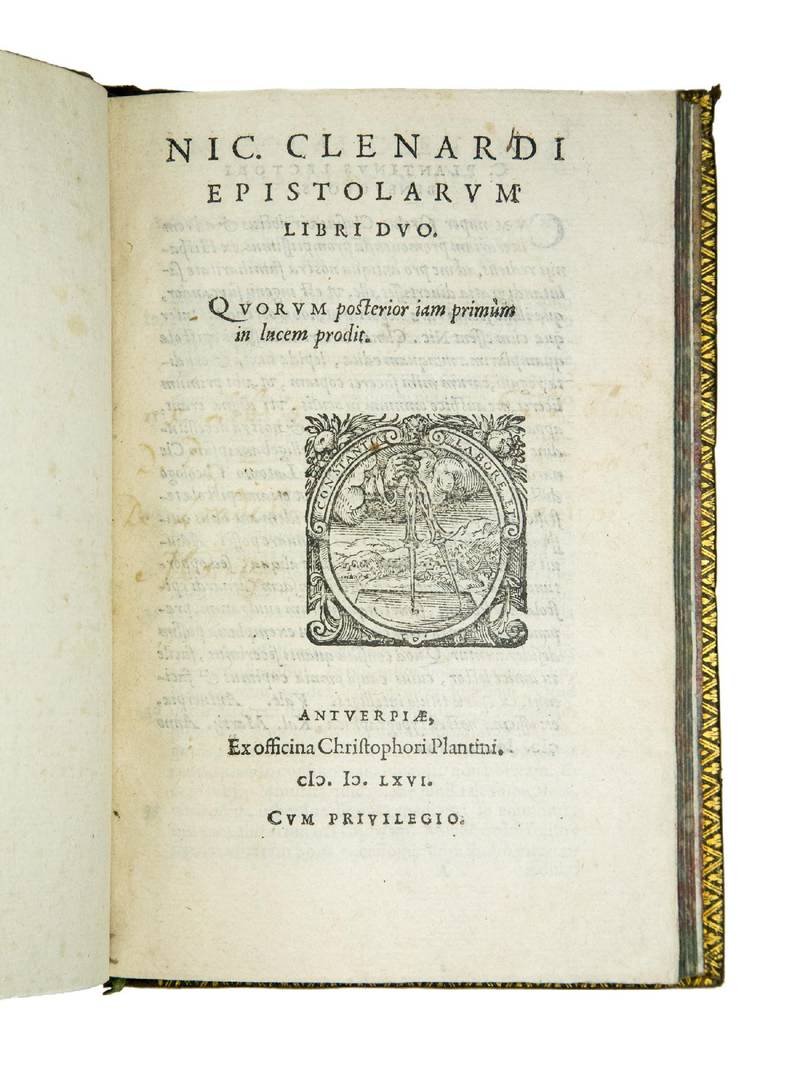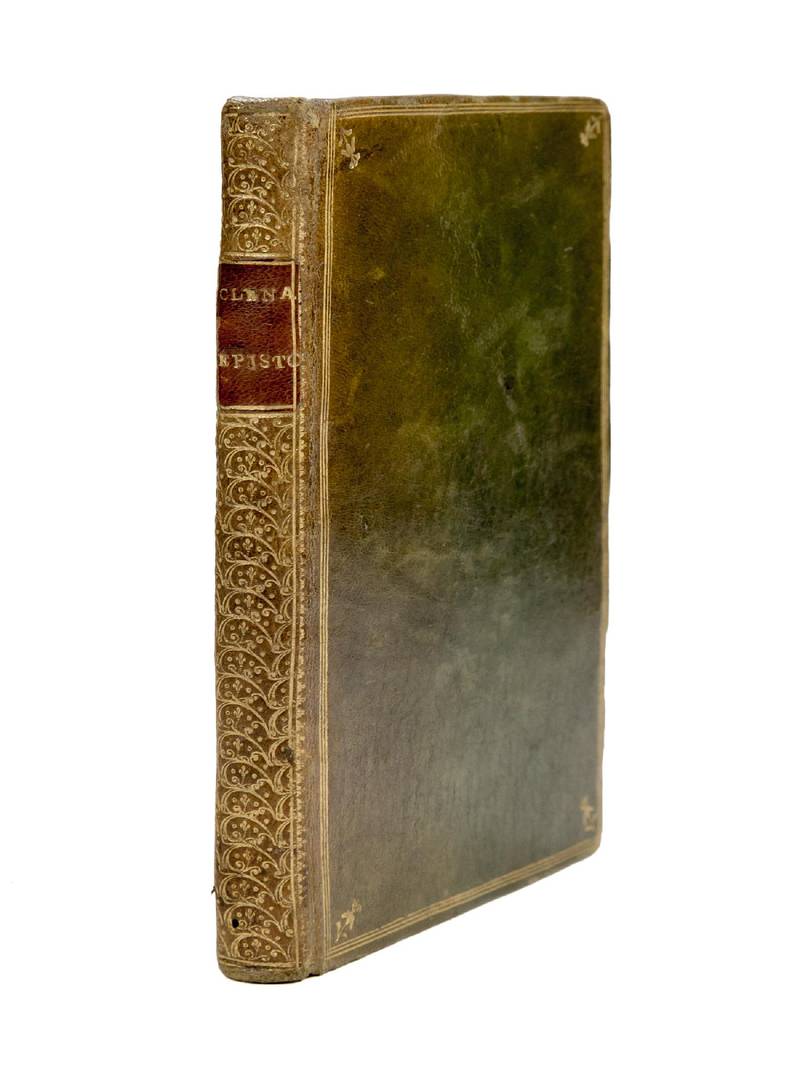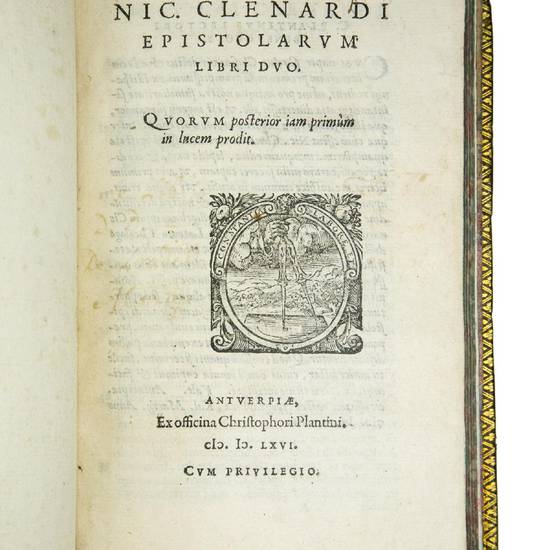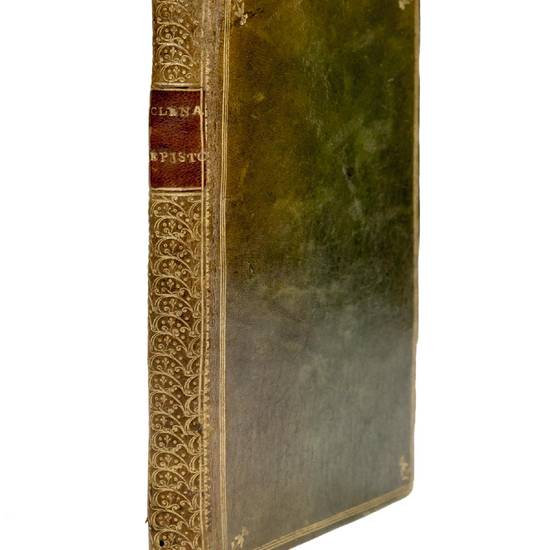8vo. 258 (i.e. 242, with errors in the pagination), (4) pp., 1 blank leaf. A-F8,G-H4,I-Q8, R4. Blank R4. With the printer's device on the title-pages of both parts. 18th century calf, richly gilt back, marbled edges and endpapers. With the printed ex-libris: Bibliothèque de la Bastide-Pomme.
Adams, C-2139, Index Aureliensis, 141.406; Voet, 996; Bakelants, L. & Hoven, R., Bibliographie des oeuvres de Nicolas Clénard, (Verniers, 1981), no. 550.
FIRST EDITION, edited by the humanist physician and pioneering botanist Carolus Clusius (1526-1609) from the originals he found in Granada and Salamanca. This is the only edition printed in the 16th century (cf. Correspondance de Nicolas Clénard publié par Alphonse Roersch, Bruxelles, 1940-1941).
Book I contains 24 letters, Book II 21. On the verso of the title-page is a preface to the reader by Christopher Plantin dated Antwerp, March 1, 1566. At the beginning of the second part is a letter by Carolus Clusius to Thomas Rediger dated Bruges, January 1, 1566.
Most notable are the letters to Johannes Latomus of July 1539 and April 1541, which contain quotations in Arabic, and the Epistola ad Christianos de professione Arabica, militiaque constituenda adversus Machometum, in which Clenardus describes his method of learning Arabic and reports his observation on Islam.
(Liber I:)
Latomus, Jacobus. Evora, March 24, 1535 (p. 3)
id. Evora, March 26, 1535 (p. 7)
id. Braga, August 21, 1537 (p. 20)
id. Granada, July 12, 1539 (p. 24)
id. Gibraltar, April 7, 1540 (p. 35)
id. Septae (Gibraltar), April 15, 1540 (p. 37)
id. Tuytuan, April 21, [1540] (p. 40)
id. Fez, May 8, 1540, (p. 41)
id. ibidem, April 9, 1541 (p. 42)
Hoverius, Franciscus (p. 54)
id. Paris (p. 55)
id. Evora, January 15, 1536 (p. 56)
id. Braga, February 27, 1538 (p. 58)
id. Braga, September 9, 1538 (p. 59)
Streyterius, Arnoldus. Fez, April 12, 1541 (p. 60)
Polita, Joachim. Louvain, August 23, n.y. (p. 67)
id. Evora, April 22, [1536?] (p. 68)
id. Evora, December 4, 1536 (p. 74)
id. Evora, July 8, 1537 (p. 90)
Vorda, Martin a. Evora, May 25, 1534 (p. 93)
id. Evora, January 10, 1537 (p. 94)
Rescius, Rutgerus. Evora, postridie Paschae [march 29], 1535 (p. 96)
id. Evora, March 24, [1536?] (p. 99 )
id. Evora, October 11, 1536 (p. 101)
(Liber II:)
Vasaeus, Joannes. Salamanca February 16, [1533?] (p. 109)
id. Salamanca, February 24, [1533?] (p. 110)
id. Salamanca, May 30, [1533?] (p. 111)
id. (p. 112)
id. Evora, December 23, [1534?] p. 132
id. Evora, December 31, 1534 (p. 141)
id. (p. 142)
id. (p. 144)
id. (p. 146)
id. (p. 148)
id. Evora, January 3, 1536 (p. 161)
id. (p. 162)
id. Fez, August 21, [1540?] (p. 183)
Coelius, Georgius (p. 185)
Arcidiaconus, Dominus (p. 187)
Parvus, Joannes, Fez, July 5, [1540?] (p. 193)
id. Fez, December 4, 1540 (p. 195)
id. Fez, August 21, 1541 (p. 198)
id. Granada, September 1, n.y. (p. 209)
Charles V. Granada, January 17, 1542 (p. 212)
Epistola ad Christianos de professione Arabica, militiaque constituenda adversus Machometum (p. 218)
Nicolaus Clenardus, a native of Diest in Brabant, matriculated in 1512 at the University of Louvain. After graduating in 1515 he taught arts courses in his college, the Pig, while taking up the study of theology under Jacobus Latomus, who was to remain his friend for life.
A priest from about 1521, Clenardus succeeded Jan Driedo as president of Houterlee's College. This appointment permitted him to pursue his humanistic studies with the help of Goclenius, Rescius, and Jan van Campen, professors at the Collegium Trilingue.
During Erasmus' years at Louvain Clenardus did not took up any personal ties with him, although he owed a considerable debt to Erasmus's epistolary style and general views. He taught privately and established his reputation as a Hebrew scholar with Tabula ad grammaticam hebraeam (1529). He also published two textbooks for students of Greek, Institutiones in linguam graecam (1530) and Meditationes graecanicae in artem grammaticam (1531), both of which met with great success and were used by generations of students.
When his terms as president of Houterlee's college had ended and Louvain did not seem to offer any further prospects for the time being (probably by a lack of reverence and prudence), Clenardus was compelled to look elsewhere.
Juan Luis Vives seems to have convinced him that Muslims could be converted to the Christian faith by force of persuasion, and he resolved to learn Arabic. He then entered the service of Hernando Colón, the son of the discoverer of America, whom he accompanied back to Spain towards the end of 1531. He taught Greek and Latin at Salamanca until 1533, when he joined Prince Henry of Portugal, who at the age of twenty-one was already archbishop of Braga. Under Henry's auspices, Clenardus founded a humanist college at Braga, which he directed until 1538. Thereafter Henry's support enabled him to study Arabic in Granada and for a while in 1540 at Fez in Morocco. He was still in Granada at the time of his death (cf. H. de Vocht, History of the Foundation and the Rise of the Collegium Trilingue Lovaniense, 1517-1550, Louvain, 1951-1955, II, pp. 220-234).
[9095]





